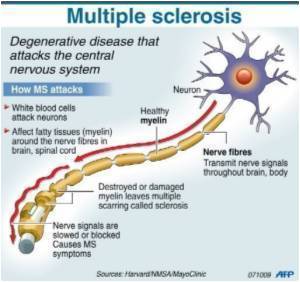A new magnetic resonance imaging (MRI) study shows that people with multiple sclerosis (MS) lose myelin in the gray matter of their brains and the loss is closely correlated with the severity of the disease.

Loss of myelin, the fatty protective sheath around nerve fibers, is a characteristic of MS, an inflammatory disease of the central nervous system that can lead to a variety of serious neurological symptoms and disability. MS is typically considered a disease of the brain's signal-conducting white matter, where myelin is most abundant, but myelin is also present in smaller amounts in gray matter, the brain's information processing center that is made up primarily of nerve cell bodies. Though the myelin content in gray matter is small, it is still extremely important to proper function, as it enables protection of thin nerve fibers connecting neighboring areas of the brain cortex, according to Vasily L. Yarnykh, Ph.D., associate professor in the Department of Radiology at University of Washington in Seattle.
"The fact that MS patients lose myelin not only in white but also in gray matter has been proven by earlier post-mortem pathological studies," he said. "However, the clinical significance of the myelin loss, or demyelination, in gray matter has not been established because of the absence of appropriate imaging methods."
To learn more about associations between MS and demyelination in both white and gray matter, Dr. Yarnykh and colleagues used a refined MRI technique that provides information on the content of biological macromolecules – molecules present in tissues and composed of a large number of atoms, such as proteins, lipids and carbohydrates. The new method, known as macromolecular proton fraction (MPF) mapping, has been hampered in the past because of the length of time required for data collection, but improvements now allow much faster generation of whole-brain maps that reflect the macromolecular content in tissues.
"The method utilizes a standard MRI scanner and doesn't require any special hardware—only some software modifications," Dr. Yarnykh said. "MPF mapping allows quantitative assessment of microscopic demyelination in brain tissues that look normal on clinical images, and is the only existing method able to evaluate the myelin content in gray matter."
The researchers looked at 30 MS patients, including 18 with relapsing-remitting MS (RRMS), the most common type of MS initially diagnosed, and 12 with the more advanced type of disease known as secondary progressive MS (SPMS). Fourteen healthy control participants were also included in the study. Each participant underwent MRI on a 3-Tesla imager, and the researchers reconstructed 3-D whole-brain MPF maps to look at normal-appearing white matter, gray matter and MS lesions. The researchers further compared the results of their imaging technique with clinical tests characterizing neurological dysfunction in MS patients.
Advertisement
"The major finding of the study is that the loss of myelin in gray matter caused by MS in its relative amount is comparable to or even larger than that in white matter," said Dr. Yarnykh. "Furthermore, gray matter demyelination is much more advanced in patients with secondary-progressive MS, and it is very strongly related to patients' disability. As such, we believe that information about gray matter myelin damage in MS is of primary clinical relevance."
Advertisement








